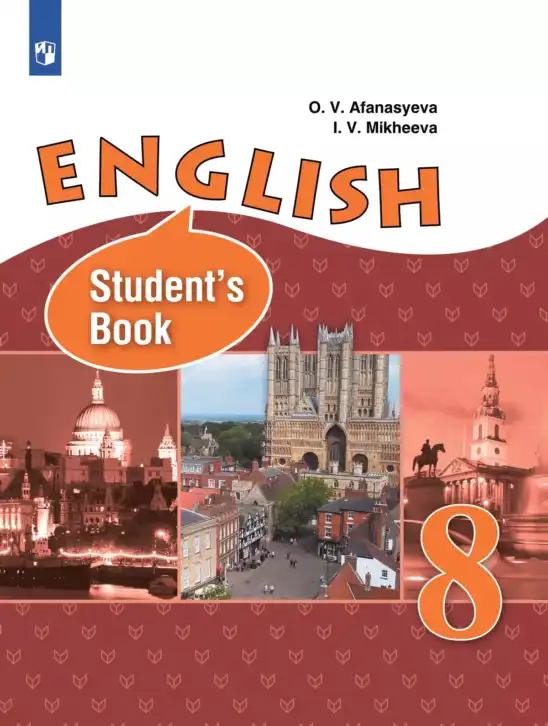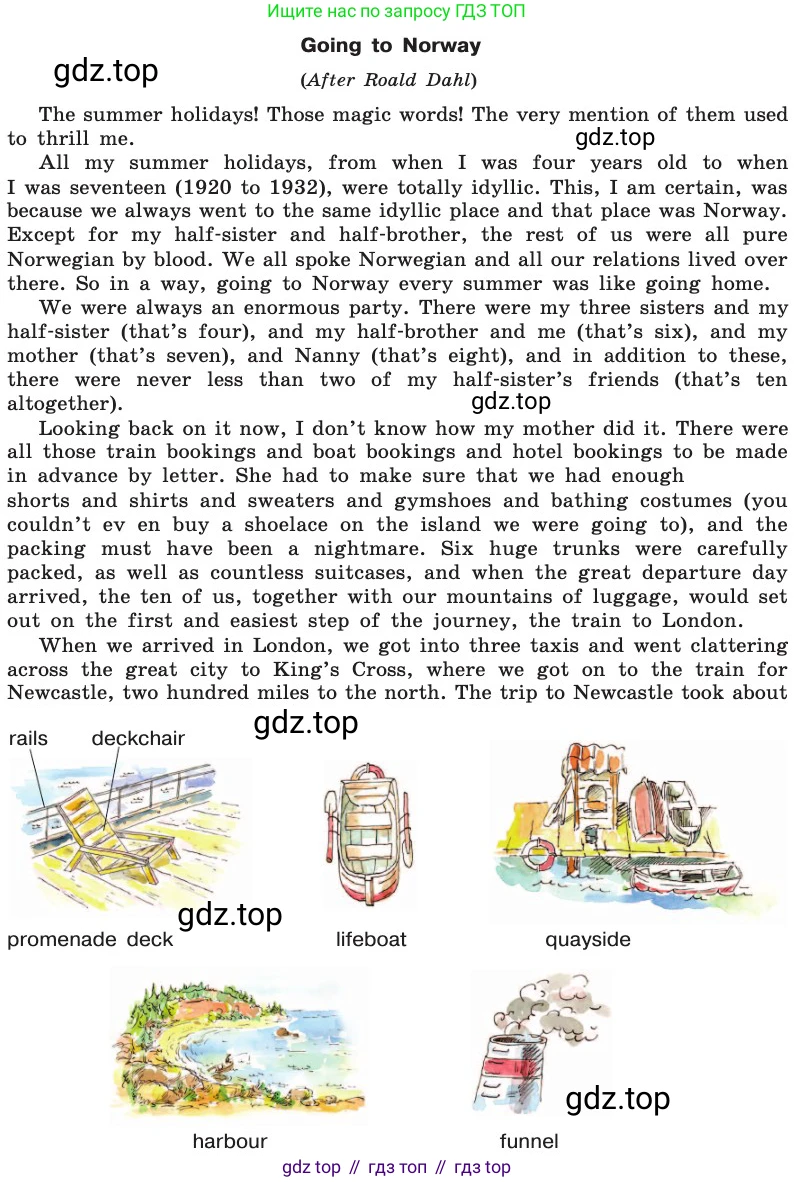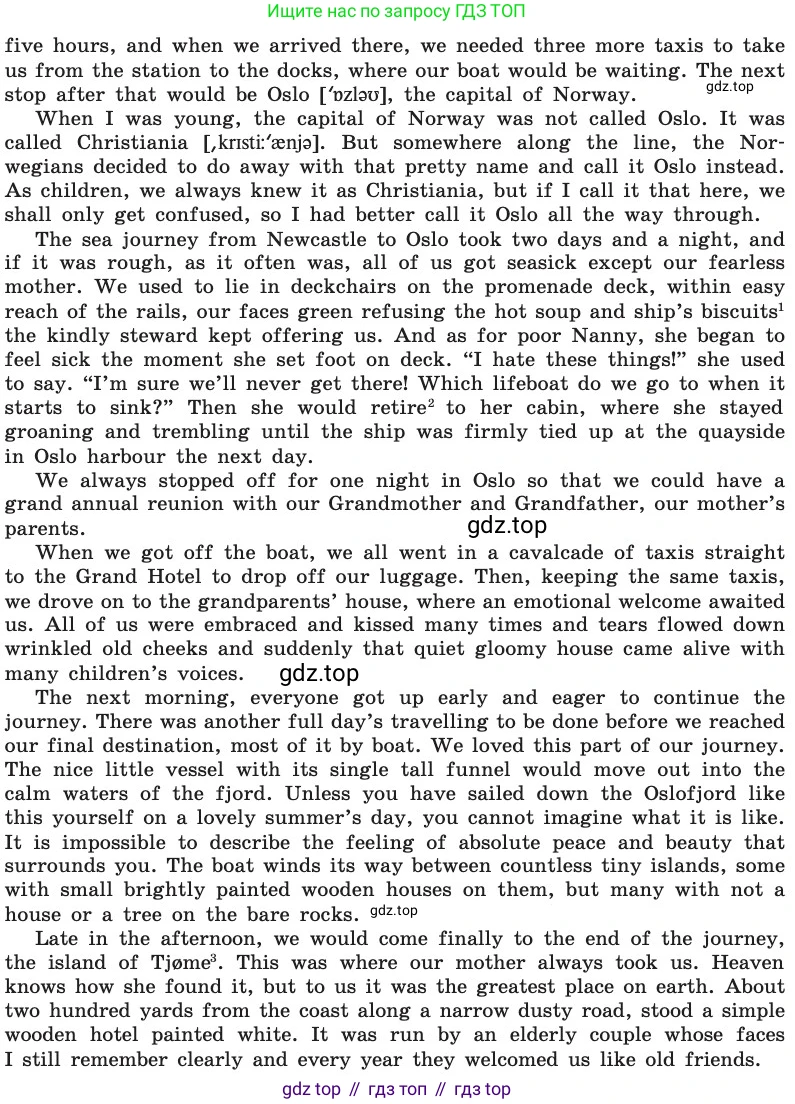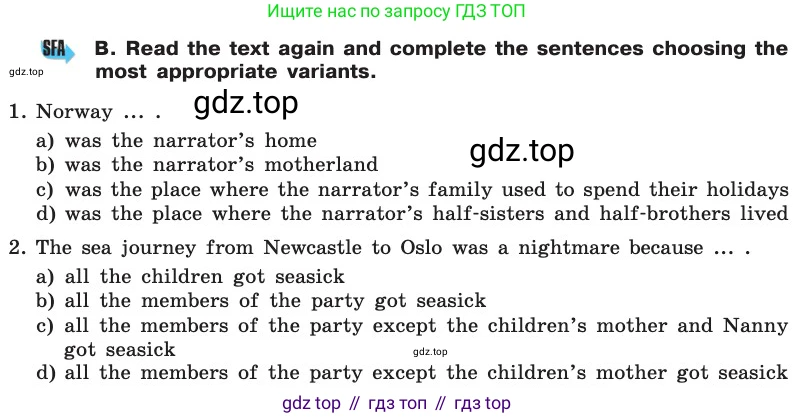Номер 61, страница 202 - гдз по английскому языку 8 класс учебник Афанасьева, Михеева

Авторы: Афанасьева О. В., Михеева И. В.
Тип: Учебник
Издательство: Просвещение
Год издания: 2014 - 2025
Уровень обучения: углублённый
Цвет обложки: белый
ISBN: 978-5-09-034201-8
Допущено Министерством просвещения Российской Федерации
Популярные ГДЗ в 8 классе
Unit 5. Going to Places: The World of Travelling. Reading for Discussion: «Going to Norway» (After R. Dahl) - номер 61, страница 202.
№61 (с. 202)
Условие. №61 (с. 202)
скриншот условия




READING FOR DISCUSSION
61 A. Read the text “Going to Norway”, say how the family travelled on the fourth day of their journey and put the following items in the right order.
a) Crossing the sea.
b) Getting ready for the great holiday.
c) The final destination.
d) The family reunion.
e) The most picturesque part of the journey.
Going to Norway
(After Roald Dahl)
The summer holidays! Those magic words! The very mention of them used to thrill me.
All my summer holidays, from when I was four years old to when I was seventeen (1920 to 1932), were totally idyllic. This, I am certain, was because we always went to the same idyllic place and that place was Norway. Except for my half-sister and half-brother, the rest of us were all pure Norwegian by blood. We all spoke Norwegian and all our relations lived over there. So in a way, going to Norway every summer was like going home.
We were always an enormous party. There were my three sisters and my half-sister (that's four), and my half-brother and me (that's six), and my mother (that's seven), and Nanny (that's eight), and in addition to these, there were never less than two of my half-sister's friends (that's ten altogether).
Looking back on it now, I don't know how my mother did it. There were all those train bookings and boat bookings and hotel bookings to be made in advance by letter. She had to make sure that we had enough shorts and shirts and sweaters and gymshoes and bathing costumes (you couldn't even buy a shoelace on the island we were going to), and the packing must have been a nightmare. Six huge trunks were carefully packed, as well as countless suitcases, and when the great departure day arrived, the ten of us, together with our mountains of luggage, would set out on the first and easiest step of the journey, the train to London.
When we arrived in London, we got into three taxis and went clattering across the great city to King's Cross, where we got on to the train for Newcastle, two hundred miles to the north. The trip to Newcastle took about
rails deckchair
promenade deck
lifeboat quayside
harbour funnel
five hours, and when we arrived there, we needed three more taxis to take us from the station to the docks, where our boat would be waiting. The next stop after that would be Oslo ['øzlaʊ], the capital of Norway.
When I was young, the capital of Norway was not called Oslo. It was called Christiania [.kristɪ'ænɪa]. But somewhere along the line, the Nor-wegians decided to do away with that pretty name and call it Oslo instead. I knew it as Christiania, but if I call it that here, we shall only get confused, so I had better call it Oslo all the way through.
The sea journey from Newcastle to Oslo took two days and a night, and if it was rough, as it often was, all of us got seasick except our fearless mother. We used to lie in deckchairs on the promenade deck, within easy reach of the rails, our faces green refusing the hot soup and ship's biscuits1. "I hate these things!" she used to say. "I'm sure we'll never get there! Which lifeboat do we go to when it starts to sink?" Then she would retire2 to her cabin, where she stayed until the ship was firmly tied up at the quayside in Oslo harbour the next day.
We always stopped off for one night in Oslo so that we could have a grand annual reunion with our Grandmother and Grandfather, our mother's parents.
When we got off the boat, we all went in a cavalcade of taxis straight to the Grand Hotel to drop off our luggage. Then, keeping the same taxis, we drove on to the grandparents' house, where an emotional welcome awaited us. All of us were embraced and kissed many times and tears flowed down wrinkled old cheeks and suddenly that quiet gloomy house came alive with many children's voices.
The next morning, everyone got up early and eager to continue the journey. There was another full day's travelling to be done before we reached our final destination, most of it by boat. We loved this part of our journey. The nice little vessel with its single tall funnel would move out into the calm waters of the fjord. Unless you have sailed down the Oslofjord like this yourself on a lovely summer's day, you cannot imagine what it is like. It is impossible to describe the feeling of absolute peace and beauty that surrounds you. The boat winds its way between countless tiny islands, some with small brightly painted wooden houses on them, but many with not a house or a tree on the bare rocks.
Late in the afternoon, we would come finally to the end of the journey, the island of Tjøme3. This was where our mother always took us. Heaven knows how she found it, but to us it was the greatest place on earth. About two hundred yards from the coast along a narrow dusty road, stood a simple wooden hotel painted white. It was run by an elderly couple whose faces I still remember clearly and every year they welcomed us like old friends.
B. Read the text again and complete the sentences choosing the most appropriate variants.
1. Norway . . . .
a) was the narrator's home
b) was the narrator's motherland
c) was the place where the narrator's family used to spend their holidays
d) was the place where the narrator's half-sisters and half-brothers lived
2. The sea journey from Newcastle to Oslo was a nightmare because . . . .
a) all the children got seasick
b) all the members of the party got seasick
c) all the members of the party except the children's mother and Nanny got seasick
d) all the members of the party except the children's mother got seasick
Решение. №61 (с. 202)


Решение 2. №61 (с. 202)
A. Прочитайте текст «Поездка в Норвегию», скажите, как семья путешествовала на четвертый день своего путешествия, и расставьте следующие пункты в правильном порядке:
a) Пересечение моря.
b) Подготовка к большому отпуску.
c) Конечный пункт назначения.
d) Воссоединение семьи.
e) Самая живописная часть путешествия.
B. Прочитайте текст еще раз и дополните предложения, выбрав наиболее подходящие варианты.
1. Норвегия ... .
a) была домом рассказчика
b) была родиной рассказчика
c) была местом, где семья рассказчика проводила каникулы
d) была местом, где жили сводные сестры и сводные братья рассказчика
2. Морское путешествие из Ньюкасла в Осло было кошмаром, потому что ... .
a) всех детей укачало
b) всех участников поездки укачало
c) всех участников поездки, кроме матери детей и няни, укачало
d) всех участников поездки, кроме матери детей, укачало
Ответ:
A. On the fourth day of their journey, the family travelled by boat through the Oslofjord to their final destination. The correct order of the events is: b, a, d, e, c.
На четвертый день своего путешествия семья плыла на лодке по Осло-фьорду к своему конечному пункту назначения. Правильный порядок событий: b, a, d, e, c.
B.
1. c) was the place where the narrator's family used to spend their holidays
c) была местом, где семья рассказчика проводила каникулы
2. d) all the members of the party except the children's mother got seasick
d) всех участников поездки, кроме матери детей, укачало
Другие задания:
Помогло решение? Оставьте отзыв в комментариях ниже.
Присоединяйтесь к Телеграм-группе @top_gdz
ПрисоединитьсяМы подготовили для вас ответ c подробным объяснением домашего задания по английскому языку за 8 класс, для упражнения номер 61 расположенного на странице 202 к учебнику 2014 года издания для учащихся школ и гимназий.
Теперь на нашем сайте ГДЗ.ТОП вы всегда легко и бесплатно найдёте условие с правильным ответом на вопрос «Как решить ДЗ» и «Как сделать» задание по английскому языку к упражнению №61 (с. 202), авторов: Афанасьева (Ольга Васильевна), Михеева (Ирина Владимировна), углублённый уровень обучения учебного пособия издательства Просвещение.
















